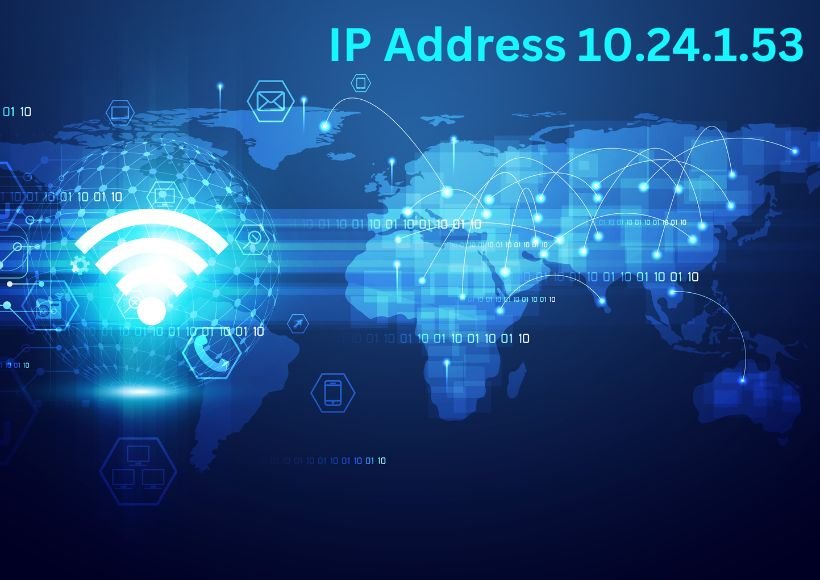Understanding The IP Address 10.24.1.53

An IP address is the unique address assigned to devices connected to a network so that they can communicate with each other. Whether you are browsing the Internet, sending emails, or accessing a file on a local server, an IP address enables the exchange of data.
IP addresses can be private or public. Private IP addresses, such as 10.24.1.53, are used in private networks, such as residential, business, and data centers. These addresses cannot directly be accessed from the Internet; instead, they send and receive data outside the network using translation.
Understanding the workings of IP addresses and their importance in networking and security maintenance forms the basis of an efficient and secure system.
This article shall cover the technical nitty-gritty of 10.24.1.53, how it works over the Internet, and how it may be kept safe.
Table of Contents
What is an IP Address, and How Does It Work?
An IP address, also known as an Internet Protocol address, is a unique address associated with a connected device recognized by the network. It works like your home address and is an electronic address assigned to a particular device for communication with other devices. There are private IPs, called internal IPs, for the office and public IPs that leverage the Internet network for information dissemination.
Technical Details of 10.24.1.53
IP Address: 10.24.1.53
Address Type: Private
Protocol Version: IPv4
Network Class: Class A
CIDR Block: 10.24.1.0/24
Network Range: 10.24.1.0 – 10.24.1.255
Network ID: 10.24.1
Broadcast Address: 10.24.1.255
Conversions:
- Decimal: 169345333
- Hexadecimal: a180135
- Numeric: 1024153
Reverse DNS: 53.1.24.10.in-addr.arpa
The Role of NAT with 10.24.1.53
10.24.1.53 is a private IP address that cannot be directly addressed or communicated on the Internet. Instead, NAT comes in handy to route Internet traffic for devices with private IPs.
How NAT Works:
- A private device (computer, phone, etc.) is assigned with the IP address 10.24.1.53 in a local network.
- When the device requests Internet access, the router translates 10.24.1.53 to a public IP address assigned by the ISP.
- When data is received from the Internet, the router translates it back to 10.24.1.53 and forwards it to the respective device.
Why is NAT Important?
Saves IP Addresses: A NAT is a store for limited public IPs. Thus, they help multiple devices share one public IP.
Stop cyberattacks: Private IPs are less likely to be exposed directly to the web and, therefore, are subject to reduced cyberattack risks.
What Type of IP Address is 10.24.1.53, and Why is it Private?
The IP address 10.24.1.53 belongs to an exclusive IP Address range (10.0.0.0 – 10.255.255.255) as classified by the IANA.
Why is It Considered Private?
Not Routable on the Internet: Private IPs are used for internal networking applications within a home, office, or data center.
Requires NAT for Internet Access: Private IPs cannot connect to the Internet directly and must use NAT for communication.
Used for Local Networking: Private IPs allow organizations and homes to manage their networks effectively without needing several public IPs.
Private Vs Public IP Addresses
| Feature | Private IP (e.g., 10.24.1.53) | Public IP (e.g., 192.158.1.38) |
| Visibility | Only within a local network | Accessible worldwide |
| Internet Access | Needs NAT to connect to the internet | Directly connected to the internet |
| Security | More secure (not exposed online) | Can be attacked if not protected |
| Example Use | Home, office, corporate networks | Websites, cloud servers, online services |
Common Mistakes and Remedies
Problems connected with 10.24.1.53
Device fails to connect to the network:
- Verify that DHCP is enabled for auto-IP assignment.
- Power(off) /unplug the router and plug it back again.
IP conflict error:
- Make sure two devices aren’t using 10.24.1.53.
- Manually assign an IP address or configure DHCP reservation.
Cannot access the Internet:
- Ensure the router NAT is OK.
- Revisit and validate the default gateway setting.
Security Features for Networks Using 10.24.1.53
These are a few of the good practices to enable for protecting the network devices utilizing private IP addresses:
- Enable a Firewall: To keep unauthorized access away from the network devices.
- Use Strong Wi-Fi Encryption: WPA3 or WPA2 guarantees hackers do not have access.
- Limit Port Forwarding: Only enable the ports needed to reduce the security risk.
- Monitor the Network: What devices use 10.24.1.53 to protect against unauthorized access?
- Enable MAC Address Filtering: Access is limited to trusted devices only.
Conclusion
The IP address 10.24.1.53 is a private IPv4 address often used in the internal networks of homes, businesses, and organizations. It can’t be accessed directly on the Internet, necessitating the involvement of NAT in interacting with external networks. Understanding the difference between private and public IPs and other security measures will ensure smooth and safe network functioning.
Do you want to check the IP address details of your network, or need help with network configuration?
